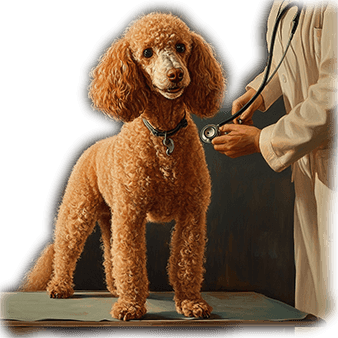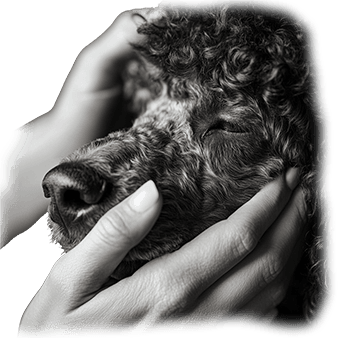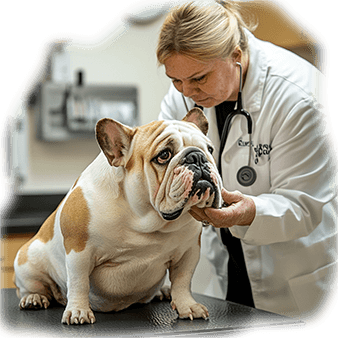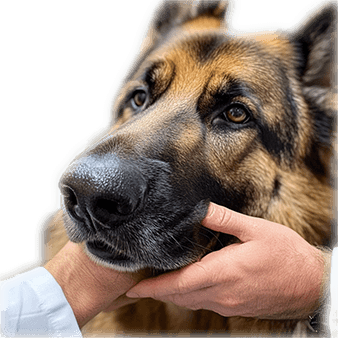Poodle Health: Caring for Your Poodle’s Well-Being
Poodles are known for their intelligence, hypoallergenic coats, and playful personalities. However, like all dog breeds, Poodles are prone to certain health issues that owners should be aware of. By understanding the unique health concerns of Poodles, you can take proactive steps to ensure your furry friend lives a long, happy, and healthy life. In this guide, we’ll cover the most common health issues Poodles face and provide helpful tips on how to care for them.
Addison’s Disease
Addison’s Disease is a hormonal disorder that affects the adrenal glands and is more common in Poodles, particularly Standard Poodles. This condition occurs when the adrenal glands fail to produce enough hormones to regulate bodily functions, leading to symptoms like vomiting, lethargy, weight loss, and dehydration.
- Early Symptoms – Addison’s Disease can be hard to spot at first. Keep an eye out for symptoms like loss of appetite, vomiting, or general weakness. If left untreated, it can lead to a crisis where the dog collapses, requiring emergency treatment.
- Treatment – This condition is usually diagnosed through blood tests and treated with hormone replacement therapy. With proper care, a Poodle with Addison’s Disease can live a normal life.
- Helpful Tip – Regular vet visits and blood tests are crucial for early detection, especially if your Poodle starts showing any unusual signs of lethargy or vomiting.

Common Poodle Health Issues
Progressive Retinal Atrophy (PRA)
Poodles are susceptible to Progressive Retinal Atrophy (PRA), an eye disease that causes the gradual deterioration of the retina, leading to blindness. PRA affects both Miniature and Standard Poodles and typically becomes noticeable as your dog ages.
- Symptoms – The first sign is usually night blindness, where your Poodle may struggle to see in low-light conditions. Over time, it progresses to complete vision loss.
- Treatment – Unfortunately, there is no cure for PRA. However, most dogs adjust well to blindness, and there are plenty of ways you can make your home more accessible to them.
- Helpful Tip – If your Poodle has PRA, avoid rearranging furniture and consider using verbal cues to guide your dog through the house. Also, ensure your home is safe by removing hazards like sharp edges or obstacles.

Hip Dysplasia
Although hip dysplasia is more common in larger breeds, it can also affect Standard Poodles. Hip dysplasia occurs when the hip joint doesn’t fit together correctly, leading to pain, arthritis, and difficulty moving.
- Symptoms – Watch for signs of stiffness, difficulty standing up, or a noticeable limp, especially after exercise. These may indicate early stages of hip dysplasia.
- Treatment – Treatment options range from weight management and physical therapy to surgery in severe cases. Joint supplements like glucosamine and omega-3 fatty acids can also support joint health.
- Helpful Tip – Keep your Poodle at a healthy weight to reduce stress on their joints. Regular, moderate exercise like swimming or controlled walks can also help strengthen muscles without putting too much strain on their hips.
Ear Infections
Poodles are prone to ear infections due to their floppy ears and dense ear hair, which can trap moisture and bacteria. Regular ear cleaning is essential to prevent infections and keep their ears healthy.
- Symptoms – If your Poodle is scratching their ears, shaking their head frequently, or if you notice a foul odor, it could be a sign of an ear infection.
- Treatment – Your vet may prescribe ear drops or medication to clear up an infection. In chronic cases, regular ear cleaning and trimming the ear hair can help prevent future infections.
- Helpful Tip – Make ear cleaning a part of your regular grooming routine. Use a vet-recommended ear cleaner and cotton pads to gently clean the inside of your Poodle’s ears, but avoid inserting anything deep into the ear canal.
Bloat (Gastric Dilatation-Volvulus)
Bloat is a life-threatening condition that can affect Standard Poodles. It occurs when the stomach fills with gas, causing it to expand and sometimes twist, cutting off blood flow. This condition requires immediate veterinary attention.
- Symptoms – Signs of bloat include restlessness, a swollen abdomen, excessive drooling, and attempts to vomit without bringing anything up.
- Treatment – Bloat is a medical emergency and requires immediate surgery. If you suspect your Poodle is experiencing bloat, take them to the vet right away.
- Helpful Tip – To reduce the risk of bloat, feed your Poodle smaller, more frequent meals and avoid vigorous exercise immediately after eating. Consider using a slow feeder bowl to prevent your Poodle from eating too quickly. Use a supplement (Amazon affiliate link) for digestive health.
Skin Allergies
Poodles are often prone to skin allergies, which can be caused by food, environmental factors, or grooming products. These allergies can result in itchy, inflamed skin and frequent scratching.
- Symptoms – If your Poodle is constantly scratching, licking their paws, or developing skin rashes, they may have an allergy.
- Treatment – Identifying the allergen is the first step—your vet may recommend a special diet, allergy tests, or antihistamines to control symptoms.
- Helpful Tip – If your Poodle is prone to allergies, use hypoallergenic grooming products and consult your vet about switching to a limited ingredient diet to minimize potential allergens.

Dental Issues
Poodles, particularly Toy and Miniature Poodles, are prone to dental problems such as plaque buildup, gum disease, and tooth loss. Regular dental care is essential to keep their teeth and gums healthy.
- Symptoms – Signs of dental problems include bad breath, yellowing teeth, or difficulty chewing.
- Treatment – Regular teeth brushing, dental chews, and professional cleanings can help prevent these issues. In some cases, your vet may recommend tooth extractions if the damage is severe.
- Helpful Tip – Start brushing your Poodle’s teeth (Amazon affiliate link) when they’re young to get them accustomed to the process. Use a dog-friendly toothpaste and brush their teeth a few times a week.
Preventive Health Care for Poodles
Prevention is always better than treatment. Here are some essential tips to keep your Poodle in optimal health:
- Regular Vet Check-Ups – Schedule annual vet visits to monitor your Poodle’s health and catch potential issues early.
- Weight Management – Keep your Poodle at a healthy weight to reduce the risk of joint problems and other health conditions.
- Grooming – Regular grooming (Amazon affiliate link) is essential to keep your Poodle’s coat and skin in good condition, and it’s a great time to check for ear infections or skin issues. Use a high quality shampoo (Amazon affiliate link) for your dog’s sensitive skin.
- Exercise – Poodles are active dogs and need regular physical activity to stay healthy. Daily walks, playtime, and mental stimulation are important for their overall well-being.

Conclusion While Poodles are generally healthy dogs, they are prone to several breed-specific health issues. By understanding the common conditions that can affect Poodles and taking preventive steps, you can ensure your Poodle stays happy and healthy. Regular vet visits, proper grooming, a balanced diet, and exercise are key to keeping your Poodle in great shape.
Further reading: “The Poodle Handbook: The Essential Guide to Standard, Miniature & Toy Poodles” (Amazon affiliate link) by Linda Whitwam.
Affiliate Disclosure
This post may contain affiliate links, which means I earn from purchases made through links. Please see the privacy policy page for more details.






